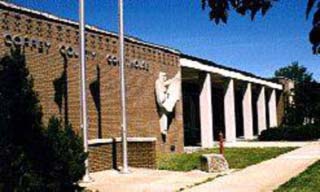
Wolf Creek Generating station is the only nuclear power plant in the state of Kansas. It plays a key role in providing electrical power for some 780,000 customers in Kansas and Missouri.
For decades, natural gas, oil and coal were the fuels of choice for generating electricity in this region. But natural gas and oil prices skyrocketed in the 1970s, supplies became uncertain, and America faced a growing dependence on foreign oil. Coal continues to be an important fuel source, but over-reliance on any one single source opens the door to power shortcomings if supply is interrupted.
There is, however, another option. Uranium used in nuclear fuel is plentiful in the United States and the world. Cost of uranium fuel is about a fourth as expensive as oil or gas, and use of nuclear fuel does not contribute to acid rain or the "greenhouse" effect.
Wolf Creek generates electricity by heating water to produce steam. Steam turns turbines which spin a magnet inside an electrical generator, thus producing electricity. Instead of burning gas, oil, or coal as a heat source, Wolf Creek produces heat by splitting, or "fissioning," atoms of uranium fuel. Water surrounding the fuel in the reactor is heated by the fissioning uranium. As this super-heated water circulates in pipes through four steam generators, heat is transferred to a second water system, which boils, creating steam which is used to spin the turbine and produce electricity.
Tours - The Wolf Creek Generating Station welcomes groups who wish to learn more about the system. The company also has a Speakers Bureau which provides speakers on a variety of topics. There is no charge for tours or speakers. The tour is approximately one hour.
Maximum group size for tours is 36, unless special arrangements are made in advance. Adequate adult supervision must be provided for children.
Wolf Creek's Speakers Bureau provides speakers for civic groups, clubs, schools, and businesses. Speakers and tours should be requested at least one month in advance, if possible.
